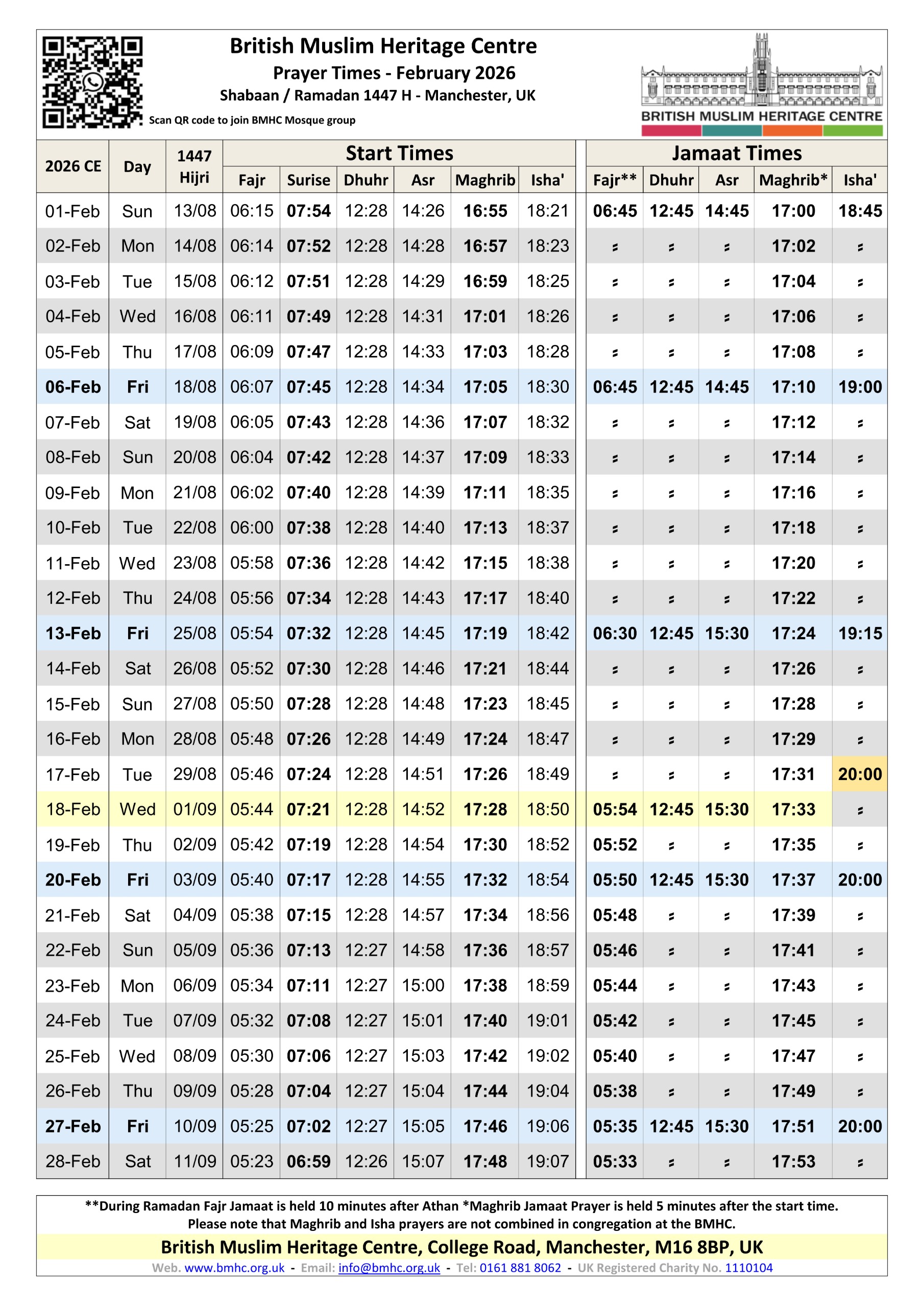History of British Muslim Heritage Centre
The British Muslim community is very diverse. While this diversity is part of its strength, it can also present an obstacle. When attempting to create a common platform to work from, particularly when interacting with a wider society, diversity may become a challenge.
Many attempts have been made to try and bring a sense of unity to the community, whilst valuing diversity. These efforts have traditionally manifested themselves through institutions such as mosques, community centres and other initiatives. While these have been positive initiatives, they have not been all-encompassing.
From the early nineties, a group of local businessmen in Manchester, community activists and professionals came together with the aspiration of building a unique institution. They aimed to create an organisation that would provide for the spiritual, educational, social and cultural needs of the community. While their particular focus was on young people, the institution was intended to appeal to Muslims from all backgrounds. However, during this period, world events including 9/11 took centre stage and everyone’s focus changed. This created a greater challenge to try and bridge the growing divide between Muslims and non-Muslims.
The BMHC has evolved as a result of many years of thinking, consulting and working together to establish a unique initiative that allows communities of different backgrounds to come together, understand and collaborate with one another. As a direct consequence, our society will become enriched. It will be stronger and more able to withstand events or forces that seek to fragment it.

The Value of Heritage
In today’s world, where radical demographic shifts are transforming society, the task of building cohesive communities is critical. Urban societies have grown increasingly multicultural as groups of different ethnicities comprising distinct cultures, languages and traditions, come to live – sometimes uneasily – side by side.
Accordingly “heritage plays an important, yet vastly unrecognised role in promoting a shared society by fostering contacts among different groups and creating social cohesion based on new, shared identities. We must all go beyond mere respect for diversity and for other people’s heritage and reposition heritage as a physical and symbolic tool that brings harmony, purpose and a common identity to all who share a community.” (G Araoz, M de la Torre and N Silberman; Club Madrid, 2010)
Many of the world’s leaders and scholars note the paucity of knowledge regarding the Islamic contribution to modern science and civilisation. In a speech to the Oxford Centre for Islamic Studies in 1993, HRH Prince Charles said,
“There is much ignorance about the debt our own culture and civilisation owe to the Islamic world. It is a failure which stems, I think, from the straightjacket of history.”
Therefore, the BMHC will provide knowledge on the contribution Muslims have made and continue to make, to the progress of human civilisation. This will be undertaken through pioneering initiatives that bring to light these historic achievements. In doing so we aim to create a unique atmosphere, bringing people together, not just at academic, professional and intellectual levels, but more crucially to the lay person living in a neighbourhood where harmony and cohesion need to be promoted.
The Challenge
Over the past decade, and particularly since the terrorist atrocities of 9/11 and 7/7, the views of wider society regarding British Muslims and Islam, are often characterised by negativity, suspicion and fear. According to an Islamic Education and Research Academy 2010 poll, three-quarters of non-Muslims believe Islam has provided a negative contribution to British society. The study also found that 63% of people did not disagree with the statement “Muslims are terrorists” and 94% agree that “Islam oppresses women”. The results are in line with a June 2010 YouGov poll that found 58% linked Islam with extremism and 69% believed it encouraged the repression of women.
If these perceptions persist and are not challenged positively, then they will only continue to further reinforce the ‘straight jacket of history’, referred to by HRH the Prince of Wales. Such perceptions become a barrier in creating a strong and cohesive community. This is why we believe by working with our partners, we can use the opportunity that heritage offers to address these barriers, tackle ignorance and overcome negative and harmful perceptions.
Muslim Heritage: Our Heritage
We passionately believe that all heritage is a shared one. We should care for, learn from and pass on this acquired knowledge and experience to future generations. This is already well recognised by the international community through the work of organisations such as UNESCO, which lists and works to protect World Heritage sites.
As Muslims, we passionately believe that God has made humans the guardians on earth, irrespective of faith or background. Since the dawn of Islam 1500 years ago, Muslims have interacted with, learned from and further developed a shared human inheritance, which has been substantially incorporated by other cultures and civilisations. However, it is painfully clear that Muslim heritage and its contribution to human development has not been given due recognition, whilst negative perceptions have been given too much exposure. The effect this has had on the silent majority of Muslims is significant.
The BMHC is a significant contribution by the British Muslim community, not only to bring to light the significant Muslim heritage of history, people and contribution to human civilisation but more importantly to bring it alive in an environment of learning, dialogue and debate. We aim to make such heritage tangible, visible, interesting and accessible for all: Muslims and non-Muslims, young and old, people of faith and those of none.



